But how did this happen?! Didn't The Sixth Sense feature one of the greatest surprises in modern film history? Didn't Signs blend Speilbergian family bonding with Hitchcockian horror? How could this man have possibly helmed The Happening, The Last Airbender, and After Earth?!
The answer is more complicated than you might think. Though critics would have you believe Shyamalan simply plunged from Oscar-worthy to all-time failure, his true journey was far more convoluted. Here are the five steps toward Shyamalan's demise, some of which weren't even his fault.
1. The Sixth Sense wasn't as good as we remember
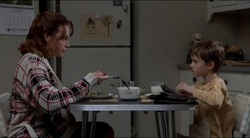 The Sixth Sense (1999)
The Sixth Sense (1999) We should have recognized The Sixth Sense for what it was: an average movie with a half dozen glimmers of brilliance (most notably, the finale). Instead, we let the stunning conclusion rewrite the movie's history on the spot. We all proclaimed Shyamalan the next Spielberg and The Sixth Sense a piece of timeless cinematic art before we'd even gotten home from the theater. We'd set the director up for failure before he'd even started his next big-budget film. This is our fault, not Shyamalan's.
Who's to blame: us
2. A clever premise and comic books masked Unbreakable's flaws
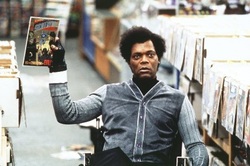 Unbreakable (2000)
Unbreakable (2000) I've written about good premises gone bad before. While the rare film maintains the creativity of a clever premise (Toy Story), many others do not (Looper, Minority Report, Up). Unbreakable began with flair: in a gruesome train wreck that slaughtered hundreds, how did one man (Bruce Willis) survive without even a scratch? Though a better answer may simply have been, "because he's Bruce Wills, that's why," Shyamalan spent 107 minutes answering the question through an elaborate tale of heroes and villains, good and evil, chance and fate. Sure, it was often quite interesting. But by the end of the movie, we lost most of the intrigue among the vocal meanderings of Samuel L. Jackson, whose carefully enunciated explanation felt more like a rehearsed excuse than a stunning reveal.
Unfazed, the general public excused the climax by appealing to the film's comic book underpinnings. It's a supernatural story, they said. It doesn't have to follow the rules! Such is the problem with super hero movies, the ultimate cinematic excuse-makers. With these films, people praise overly-intricate plots for their "studious observance of comic book lore." Fans accept bizarre explanations because the movie follows "the laws of the comic's universe, not ours." Judged by real-world standards, Unbreakable's latter half is absurd. But with Marvel's logo emblazoned among the credits? A full presidential pardon.
In fairness, Shyamalan released this film before the recent comic book movie renaissance, so he can't be blamed for writing a calculated script.
Who's to blame: Batman and Robin
3. Shyamalan was never "Master of the Twist Ending"
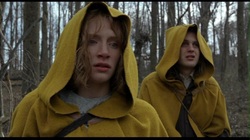 The Village (2004)
The Village (2004) Unfortunately, by Signs' debut the "twist ending" label was fastened to director more resolutely than the camera on Jaden Smith in After Earth. With each subsequent release, critics dissected the latest Shyamalan "twist" with an impossibly-high, Sixth Sense standard. In reality, only The Village--with its honest-to-Hollywood twist ending—deserved such intense scrutiny. Regrettably, the damage was done.
As a man who likes to write and direct his feature films, Shyamalan has been criticized for dismissing the input of others. With the surprise endings, however, he listened to his twist-loving fans just a little too closely. Once Unbreakable's ending failed to garner the same blockbuster praise as The Sixth Sense, he should have abandoned twists entirely. Instead, he stuck just closely enough to the old formula that critics gleefully applied the same impossible grading rubric. When everything you produce gets measured against your very best, you're bound to fail. I'd blame the critics, but Shyamalan chose to stick to his formula. This one's on him.
Who's to blame: Shyamalan
4. Shyamalan followed the wrong instincts
 Lady in the Water (2006)
Lady in the Water (2006) Once again, Shyamalan had fooled viewers. With The Sixth Sense and Signs, he had played up scene and played down speech, creating delightfully spooky moods with very little on-screen conversation. Meanwhile, Unbreakable's comic book loquacity had gotten a pass from the geeks, while The Village's stilted discussions had seemed at least somewhat reasonable for the removed, 19th-century setting. Here, however, was Shyamalan's true writing, laid bare in a modern-day, apartment complex flick starring American everyman Paul Giamatti. In short, Night couldn't write.
It's really a shame, because so many of Shyamalan's other early instincts—shot selection, mood, visual composition—were superb. He may have had the right intentions, but Shyamalan deserves full blame for selecting all the wrong moments to follow his gut.
Who's to blame: Shyamalan
5. Shyamalan refused to play it safe
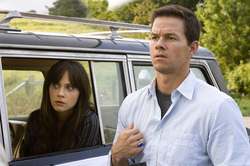 The Happening (2008)
The Happening (2008) The Happening actually opened with promise, with a spooky premise (scores of people begin committing suicide, as though under a spell), a couple popular stars (Mark Wahlberg, Zooey Deschanel), and Shyamalan's broadest narrative setting yet (a national crisis instead of an American home or intimate community). Unfortunately, the movie fell apart faster than a new NBC sitcom, with no true direction, ludicrous scientific explanations, and a plot that had—rather transparently—no plans beyond its opening premise. Even Wahlberg and Deschanel seemed to wither along with the film, first urgent, then confused, and finally, robotic and emotionless.
For reasons of charity, I won't belabor the details of The Last Airbender, except to say that it involves something called the "Fire Kingdom," features a "Southern Water Tribe," and was the second-worst-reviewed movie in all of 2010 (just above Vampires Suck).
It wasn't until seeing After Earth--an uncharacteristically bland Shyamalan film I suspect was commandeered by Will Smith—that I realized how bold he had been with his previous directorial choices. However awful his movies were, Shyamalan was rarely boring. Granted, The Village often blundered along aimlessly like a baby elephant, but the world of its community—with its youthful dares, overly-proper dialect, and rigid adherence to custom—had a certain quirky charm. Even if Lady in the Water was a mess, its juxtaposition of day-to-day apartment life with the fantasies of a child's storybook had an odd mischievousness, something missing from much of modern cinema. More than anything, we mourn the director's missteps because we see his marvelous potential in rare moments of idiosyncratic genius. Even if he fails more than he succeeds, we can't blame him for trying. Let's just hope he's not done experimenting; I'm looking forward to the next flicker of Shyamalan greatness.
Who's to blame: Will Smith

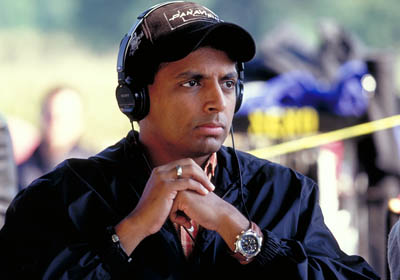
 RSS Feed
RSS Feed
